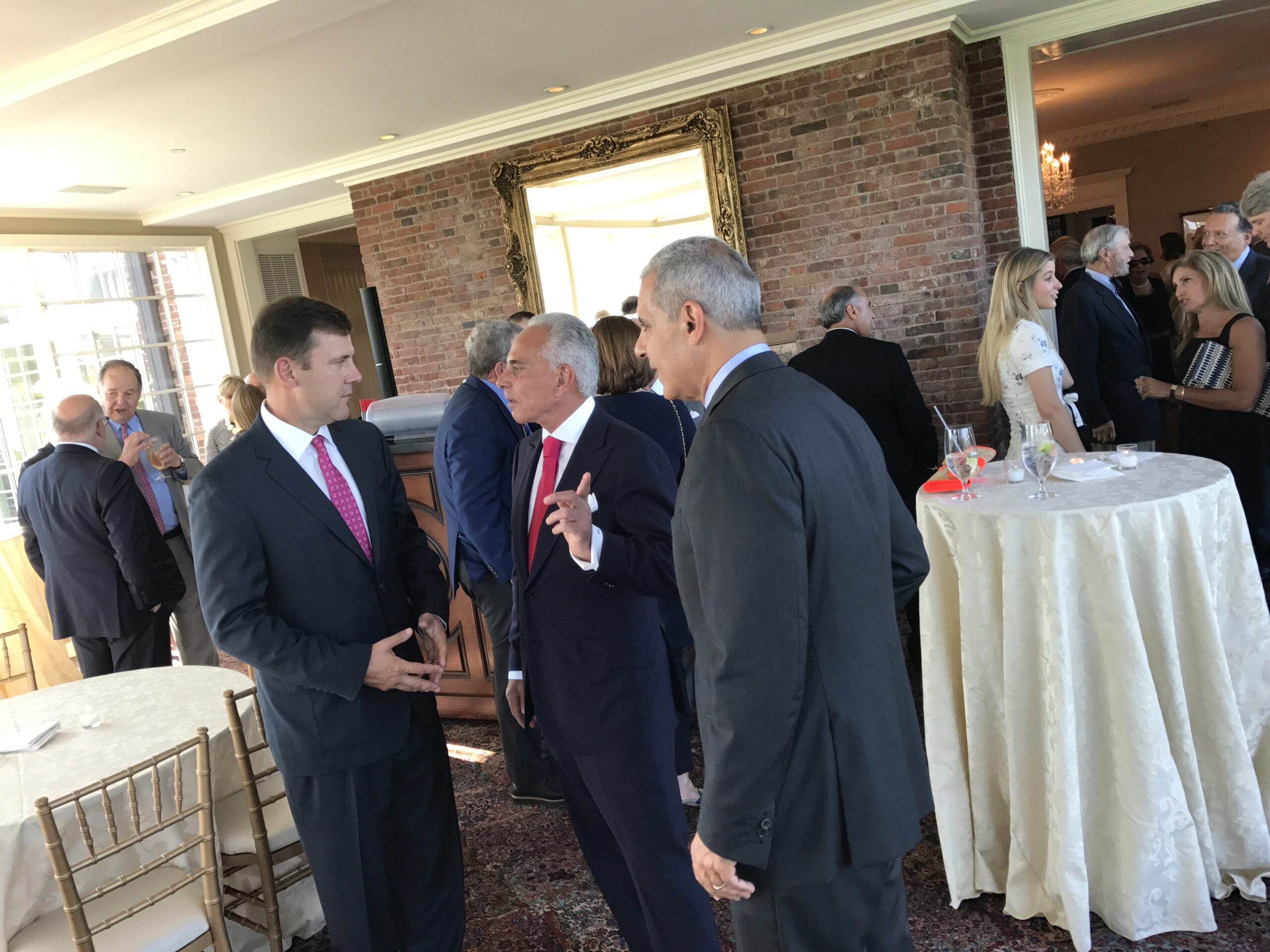
Podcasts deserve reliable consideration and objective feedback. Unlike books, film, visual art and recorded music, there’s not an authoritative repository of thoughtful, journalistic reviews of the form. Fans must rely completely on listener reviews, which are annoyingly solicited at the end of every podcast with a cloying “If you like what you hear, leave us a review.” That’s no way to create reliable reviews, so I’ve carved out space on The Media Globe to review podcasts.
One of the reviews I wrote is a podcast I enjoy called “Inside the ICE House.” It’s hosted by Joshua King, who has headed PR for ICE and the New York Stock Exchange for several years. It’s designed to show the CEOs of various NYSE listed companies in a favorable light, so it’s not exactly journalism, but Josh is a funny and engaging host whose enthusiasm for these businesses—even the boring ones like trucking technology— seems genuine.
I have a funny personal history with Josh.
At the time I met him in 2011, I had never ever been fired from a job — not a minimum wage job in high school, not working for the most powerful people on earth, never. That was a point of pride for me. Josh had been a confidant of President Clinton, charged with advancing events. That’s complex and important work, but he kind of graduated into a quasi speech and messaging role for the president as well. Then he landed working for this guy Joe Plumeri who had somehow become the CEO of Willis Financial, a company no one had ever heard of except Chicagoans who were annoyed that they bought the naming rights to the Sears Tower (which everyone still called the Sears Tower anyway).

So Joe and Josh hired me to write Joe’s commencement speech for his alma mater William & Mary. For 20 years or so, I’ve written a commencement speech just about every year (I did two in 2018 for Ursula Burns, and they were both widely regarded as home runs, mostly because she’s amazing. I’ve written for her a lot and she busts my chops about how incongruous it is that a white, right-wing man nails her voice better than anyone—she calls me “pale stale and male.”) Even in 2011, I didn’t really need the work—it’s hard and time-consuming—but these can be great speeches and tend to be more interesting and wide-ranging than the other speechwriting I have to do, so it keeps my chops sharp. I think I agreed to do the Plumeri one for $12,000, which is way under my rate, but Joe is a good friend of Lew Eisenberg, who I love. And the guy who made the shiddich—Dan Gerstein, who runs Gotham Ghostwriters—is a friend (and like Josh, has a long history in high-level politics working for Democrats).
I had my first meeting with Joe, somewhere downtown, and I immediately sensed this was not going to go well. Speechwriting is like joining a band — you might all be good players, but there’s a ton of chemistry and style questions that are hard to predict. I asked Joe to explain the essence of what he hoped to communicate. He told me “I want these kids to go play in traffic.” Meaning, he wanted them to take risks outside their comfort zone. OK, good start. So what else, Joe? “The kids should play in traffic, you know what I mean? They should learn to play in traffic.”
I kid you not, this guy, the CEO of a major reinsurance giant with 18,000 employees, repeated the phrase “play in traffic” to me at least 100 times in an hour and a half conversation. I have the tapes. I am an experienced and skilled interviewer. I know how to coax from a subject the details and anecdotes that add color to a theme. “Play in traffic” was actually a perfectly fine, if somewhat obvious, theme for a speech.

I’d say, “OK, Joe, give me an example of a time in your life when you personally put to work your belief in the concept of ‘playing in traffic.'” And he’d say in his super likable, personable way, “Yeah, that’s what I’m talking about! You gotta play in traffic! These kids gotta learn. They should be playing in traffic.”
It was like the guy was stuck in some kind of glitch, like when Terminator gets wet. Josh was in the room with Joe and me, or on the phone, for all of the conversations (which is also not a great way to develop the intimacy and voice needed to make a speech succeed), so I’d look over at him after the 85th repetition of “play in traffic” and he’d shrug as if to say, “do your best.”
I went down to William & Mary and interviewed all the right people there—the valedictorian, a disabled kid who was succeeding, blah blah blah. It’s an amazing campus and they put me up in the Plumeri House, which is right next to Plumeri Stadium. (That’s how you get asked to deliver commencement, unless you’re Jon Stewart). I handed in my draft and Josh was like, What the fuck, this barely says anything except ‘play in traffic.’

Josh scheduled an emergency intervention in midtown for Joe to read me the riot act. I remember that it was scheduled for like 1:30 and I walked in at 1:31, and Josh said, “You’re late. You’re lucky Joe is not here yet because he’d fire you for being late.” I wish I was kidding. Joe comes in and reads me the riot act about my draft failing to rise to Churchillian greatness. We talk a little more and I strain to pull some anecdotes out of him. He tells me one about how on his first day at W&M the professor, who’d improbably never met an Italian, calls roll for “Joseph Plumber-Eye.” OMG, you guys, get it?!?!?! He mispronounced the name!!!! Just think of the magic Jon Favreau or David Frum or Peggy Noonan could have weaved with that gem. I hand in my new draft, knowing I was gonna get canned and sure enough Josh canned me. And wasn’t nice about it.
I watched the speech Plumeri eventually delivered, and he repeated “play in traffic” at least 8 times. Totally forgettable, nothing of substance, not a single memorable or nuanced thought. Stunningly, one of his lines is included in an NPR blog called The Best Commencement Speech, Ever. “You can Google for an answer. You can Google for a mate. You can Google for a career. But you can’t Google to find what’s in your heart – the passion that lifts you skyward.” It’s a treacly, moronic line, and it doesn’t even make sense. “Google for a mate”? Yet he was actually quite likable and funny in it, and his charm made it somewhat bearable.
Because of that experience, I made the decision that I’d never take shit from any client again. I’ve written hundreds of speeches, including nationally broadcast prime time addresses and ones that have gotten me personally scrutinized and ones that are just nice, boring, competent addresses that big shots have to deliver. But that experience made me realize that life is too short to force it — not good for the client and definitely not worth the brain damage for me.
In a funny denouement, Josh eventually became a writer for the Observer and even kind of a friend. Later, he was working for Plumeri at a client of Teneo when I was there so we had reason to connect again. He later went on to invent a very good seltzer water called Dr. Priestley’s, which is akin to my own adventures in Pelican Punch.
In a second denouement, I ran into Plumeri at a small gathering in summer 2017, held to celebrate Lew Eisenberg being named the US Ambassador to Italy. Only about 20 attendees (including President Trump, who stopped by to congratulate Lew). I went up to Joe to see if he’d remember me. He didn’t. I reminded him I was the speechwriter he’d fired for his W&M commencement. He smiled and said he’s calmed down a lot since then and I shook his hand and said I had too.